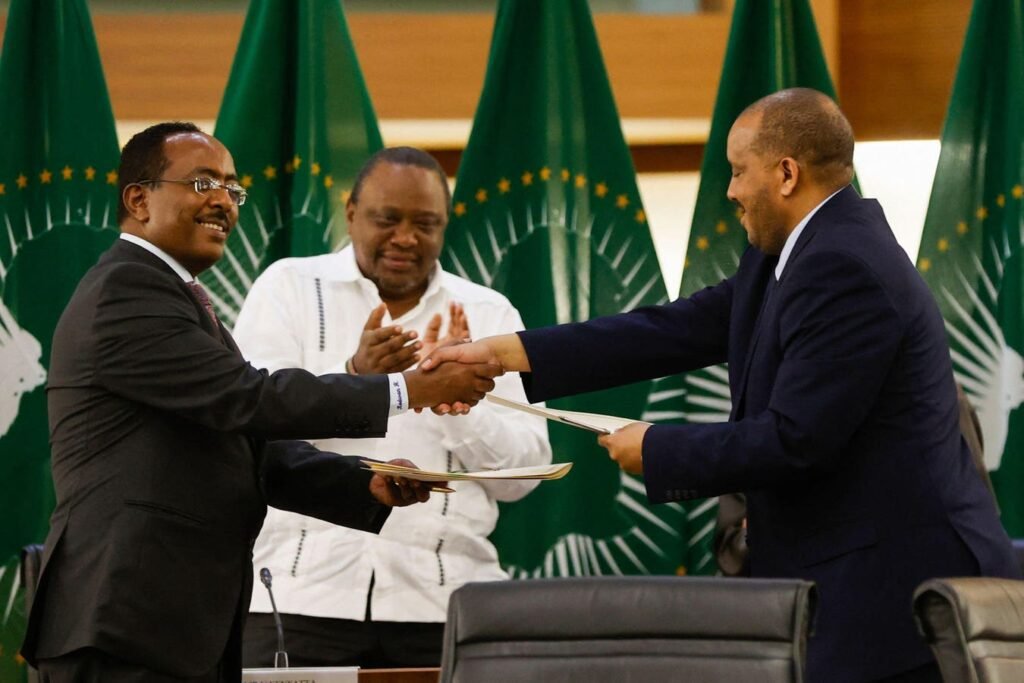Redwan Hussein (L), representative of the Ethiopian government, and Getachew Reda (R); … [+]
In October 2023, as the UN Human Rights Council concluded its autumn session, the International Committee of Experts on Human Rights in Ethiopia (the Committee of Experts), an ad-hoc body established to investigate allegations of human rights violations and supporting Ethiopia’s accountability efforts, it published final report before the end of his mandate. The Committee of Experts highlighted the seriousness of the crimes committed by all parties to the conflict in Ethiopia since 3 November 2020 and their implications for future peace and stability. As it found, “The Ethiopian National Defense Forces, the Eritrean Defense Forces, regional forces and associated militias have committed violations and abuses in Tigray on a staggering scale. These included mass killings, widespread and systematic rape and sexual violence, including sexual slavery, against women and girls, deliberate starvation, forced displacement and large-scale arbitrary detention. These amount to war crimes and crimes against humanity.” It is further added that “Tigray militants and allied militias have also committed serious violations and abuses against civilians in the Amhara and Afar regions, including killings, widespread rape and sexual violence, destruction of property and looting, which also amount to war crimes.” In Oromia, the Commission found ongoing patterns by government forces of arbitrary arrest and detention and torture of civilians, particularly men and boys, accused of links to the non-state armed group the Oromo Liberation Army. Extrajudicial killings of civilians go on with impunity, while sexual violence against women and girls continues but is severely underreported.”
The Committee of Experts confirmed that many of these violations are ongoing, despite a ceasefire agreed in November 2022 in Pretoria, South Africa. It found that “Eritrean troops and Amhara forces and militia members continue to commit serious violations in Tigray, including the rape and sexual violence of women and girls.” The Commission also found the “ongoing forced expulsion of Tigrayians from Western Tigray, with tens of thousands of women, men and children unable to return to their homes. Beyond Tigray, other parts of Ethiopia are witnessing violence and instability. The Commission receives regular reports of armed clashes between government forces and Amhara armed groups, including Fano militias, under the state of emergency declared on 4 August 2023, particularly around Gondar, Gojjam and the North Shewa zone, but with incidents reported in all Amhara zones’. The Commission further is indicated that “in Oromia, particularly Western Oromia, the Commission has confirmed the use of airstrikes, particularly drone strikes, as part of its counter-insurgency strategy against the Oromo Liberation Army (OLA).”
In another report, published in September 2023, the Commission clearly declare yourself that “further investigation is required into ongoing violations and other risks of future atrocity crimes. This includes the situation in Amhara, Oromia and Western Tigray, as well as reports of violations by the Eritrean Defense Forces in other areas of Tigray. Additional investigations into administrative and senior structures, including intent, are also required in relation to the conflict from 3 November 2020.”
Despite the continued plight, as the UN Human Rights Council concluded its autumn session in October 2023, there was little interest in ensuring that the mandate of the Committee of Experts was extended for another term so that it could continue its work. This is a step back for any attempt at justice and accountability in Ethiopia.
In November 2023, one year after the ceasefire agreement in Pretoria, South Africa, the Simon-Skjodt Center for Genocide Prevention at the US Holocaust Memorial Museum published a report “A Way Forward for Justice and Accountability in Ethiopia” identifying what should happen to ensure justice and accountability for victims of atrocities. The report said that “genuine and inclusive transitional justice efforts are needed to repair the damage of past mass atrocities in Ethiopia and mitigate the risk of future atrocity. Justice efforts that lack substance or sustainability, even if they seem more palatable in the short term, will entrench cycles of impunity and lead to disastrous consequences. The Ethiopian government’s half-steps must not successfully deflect international scrutiny.” The report, co-authored by Ambassador Stephen Rapp, former US Ambassador for Global Criminal Justice from 2009 to 2015, suggested that “a genuine and holistic approach to transitional justice would include four mutually reinforcing efforts that victims are entitled to: seeking the truth, formal accountability, compensation and guarantees of non-repetition”. The report makes several recommendations on how to ensure progress on justice and accountability.
Among other things, it recommends that states provide funding and capacity building to civil society organizations that document mass atrocities. and that the UN Human Rights Council establish a UN Special Procedures Mandate on the human rights situation in Ethiopia. While the situation in Ethiopia fades from the world’s radar, the ongoing atrocities demand continued attention and response. Justice and accountability are some of the most urgently needed steps to address the situation, and steps that continue to be neglected. The Simon-Skjodt Center for Genocide Prevention’s proposed plan demands the attention of anyone working for justice and accountability in Ethiopia.
